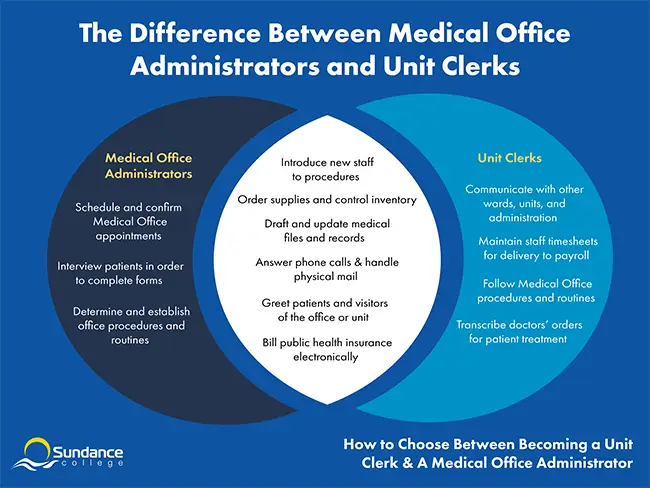Blog / How to Choose Between Becoming A Unit Clerk & A Medical Office Administrator
How to Choose Between Becoming A Unit Clerk & A Medical Office Administrator

Medical Office Administration – Health Unit Coordinator Diploma
- Medical Receptionist
- Medical Secretary
- Medical Office Assistant
- Hospital Unit Clerk
Table of Contents
Medical Office Administrators serve an important role in the healthcare system. Like many of the things we rely on in our daily lives, there’s a lot of work that goes on behind the scenes to make it work.
Medical office administration makes everything run smoothly for other medical professionals like physicians and nurses, as well as for the patients themselves. Have you ever thought about how you can help improve experiences in the medical system by becoming a Medical Office Administrator?
Two positions within the medical administrative assistant career path are very similar, specifically, Medical Office Administrator (MOA), also known as Medical Office Assistant, and Hospital Unit Clerk. Both career choices are great options for anyone interested in working in healthcare. If you’re wondering how to choose between becoming a Hospital Unit Clerk or a Medical Office Administrator, this article will help you see where your preference might lie!
What Do Medical Office Administrators Do?
If you’ve ever looked at a medical office or other medical setting and wondered how doctors do it all, you should know they greatly rely on what their MOAs do every day. The MOA’s day-to-day consists of a lot of tasks that make a medical office run, and their duties and responsibilities range from direct patient care to office administration.
As an MOA in a medical office setting, you might have patient care duties like taking height and weight measurements or vital signs in addition to various administrative tasks. However, the day-to-day looks different if you perform the same or similar role in a hospital, which is what typically defines a unit clerk position.
The Difference Between Medical Office Administrators & Hospital Unit Clerks

There’s a reason our Diploma has both job titles included in its name. Health Unit Coordinators, or Hospital Unit Clerks, and Medical Office Administrators (MOAs) have many duties in common.
Canada’s National Occupational Classification (NOC) codes group these career paths together, stating that medical administrative assistants, code 1234, can work in a variety of settings, including doctors’ offices, hospitals, clinics, or other medical settings.
However, there are some key differences, including the extent of direct patient care you might provide and where. If you like the idea of working in long-term care facilities or walk-in clinics, outpatient medical office administration might be the best path for you. Alternatively, a hospital is what is referred to as an inpatient setting, which is where Unit Clerks work.
Outpatient settings are those where patients go when there’s no emergency requiring hospitalization, often with an overnight stay under a physician’s supervision. Patients who do require hospitalization are in need of inpatient care, which is where hospitals come in.
Hospital Office Administration Jobs
Hospitals are complex workplaces because they provide a range of inpatient care, including diagnoses, surgery, and emergency medical treatment. In order to function properly in providing that myriad of services, they require both the medical care provided by doctors, nurses, technicians, and therapists, as well as the critical work carried out by skilled hospital administration positions, such as unit clerks.
And they need numerous administrative supports; their administrative needs are a lot like those you would find in a walk-in clinic, but because hospitals are much busier and more complicated, they need a lot more administrators. The complexity of the moving parts in hospitals requires significant resources, both human and material, to make a hospital unit capable of supporting inpatient care.
Unit Clerk Job Duties
Hospital office administration support workers like Unit Clerks primarily provide clerical support, including:
- maintaining & updating patient information
- filing and distributing staff information
- transcribing doctors’ orders for patient files
- communicating with other health units
- billing public health insurance procedurally
- updating and ordering supply inventories
- & more
Unit Clerks transcribe orders for diagnostic tests, drug administration, and anything else deemed necessary by a doctor; unit clerks also have to handle information and resources procedurally.
If you enjoy focused work in fast-paced environments, there are a lot of opportunities for these administrative support roles at many hospitals.
What Is The Current Demand For Unit Clerks?

All across Canada, these positions are in demand. In Alberta, for example, there are now over 1500 open unit clerk positions for Alberta Health Services. On the Winnipeg Regional Health Authority’s job board, there are currently over 1000 job postings for unit clerks. And there are more in Manitoba’s four other health authorities.
Canadian regional health authorities (your employer if you become a Unit Clerk) are hiring for the position, which should also inform your decision no matter where you live.
Similarly, our Overview of Medical Office Administration blog article provides information on the rising demand for Medical Office Administrators.
What Core Qualifications To Become A Medical Office Administrator Or Unit Clerk Do You Need?
Like so many roles available today, job skills are the most important selling point on any job application. You will want to choose a diploma program that focuses on job skills so you can present the necessary qualifications.
Graduating with a comprehensive set of job skills from a respected diploma program will make all the difference in a job application you submit as an aspiring Medical Office Administrator or Unit Clerk.
It’s critical to master all these job skills, so you’re ready to provide value to your employer right away. But you might be wondering how to identify the most important courses you need to excel in — to make your job application that much stronger.
Top 5 Key Medical Office Administration Courses

Medical Office Administration Diplomas are made up of multiple important courses. It goes without saying that all courses in a Diploma program are critical to success in the workplace. But if we had to pick five key courses, the following are the ones you’ll want to ace:
- Anatomy & Medical Terminology I
- Anatomy & Medical Terminology II
- Clinical Procedures
- Medical Office Procedures
- Electronic Medical Records & Billing
TOP 5 KEY UNIT CLERK COURSES

If you’re leaning towards becoming a Hospital Unit Clerk, these 5 courses are ones you’ll need to excel in.
- Unit Clerk Procedures
- Anatomy & Medical Terminology I
- Anatomy & Medical Terminology II
- Medical Transcription
- Electronic Medical Records & Billing
Enroll In Our MOA Program
In summary, a key distinction between a position as a Unit Clerk or an MOA lies in whether your medical setting of choice is inpatient or outpatient. But you don’t have to choose now. Sundance College’s Medical Office Administration – Health Unit Coordinator Diploma includes the courses you need to work in any health setting as an MOA or a Unit Clerk.
Our Diploma includes a practicum so that you graduate with experience in your field – and that may help you decide which health setting you prefer working in. By gaining real-world experience, you can further evaluate which role might provide the most satisfaction professionally and personally at this stage of your career. Connect with an Admissions Advisor today and take the first step towards deciding today!
The Sundance difference lies in our support for student success and individualized learning styles in a positive, caring environment and we are here to help to support your career choices.
Related Blogs
Subscribe for more career advice
Blog Categories
Share on:
